No results were found for the filter!
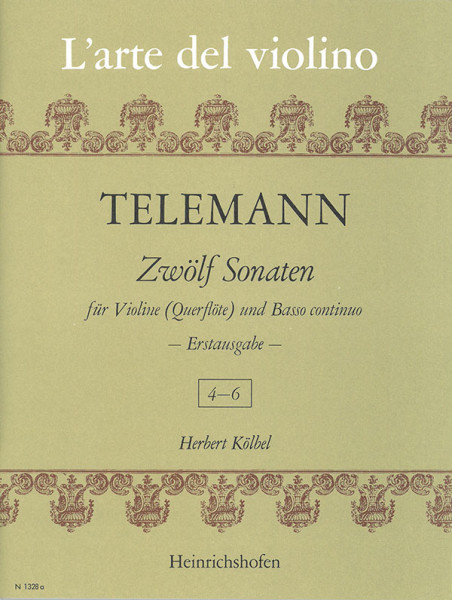
Georg Philipp Telemann
Twelve sonatas | sonatas 4 - 6 | volume 2 Violin (flute) and basso continuo
First edition This edition is based on a manuscript from the Staatsbibliothek Berlin, Preußischer Kulturbesitz, Musikabteilung. It comes from the estate of Telemann, who gave it to his grandson Georg Michael Telemann (1748-1831). G. Poelchau acquired the manuscript in 1834 with a pack of music stored in a church tower in Riga. From Poelchau's estate († 1836) the sonata work came to the Royal Library in Berlin. The sonatas are dedicated to the brothers of a Hamburg patrician family (Rudolf, Hieronymus and Johannes Wilhelm Burmester) dated 1 March 1734, with the note that they follow the ‘12 methodical sonatas’, which were also dedicated to the first two brothers. The close connection between the two large sonata works can be found in their valuable musical content, in the sequence of movements (slow, fast, slow, fast), and in the succession of keys (C-a-D-h-E-F-d-G-e-A-f sharp-g). The bass lines are often involved in the theme. Occasionally we are reminded of J.S. Bach's inventions. In the title, the violin is named as the solo instrument before the flute, as several sonatas are unmistakably written “violinistically” without this hindering their playability for flute. The present edition adheres strictly to the manuscript. Suggestions for dynamics are indicated as such by brackets, as are those for articulation (by dotted lines), which may differ for violinists from those intended for flute. Experienced players should use the original figured bass for their own interpretation. The 12 sonatas made available to the public here for the first time are among the best compositions of this kind by Telemann, who dedicated them to ' connoisseurs and lovers' with the wish '. ..faire une bonne partie de Vos amusements' . The sonatas will fulfill this purpose today just as they did at that time. Content: IV. Largo Allegro Andante Vivace V. Largo Allegro Grave Vivace VI. Andante Presto Cantabile Vivace
Mehr €27.50 *
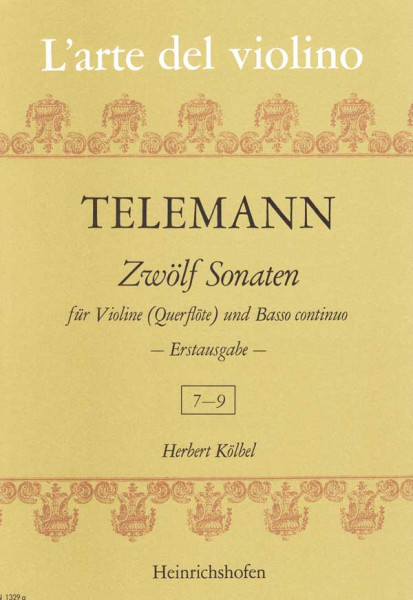
Georg Philipp Telemann
Twelve sonatas | sonatas 7 - 9 | volume 3 Violin (flute) and Basso continuo
First edition This edition is based on a manuscript from the Staatsbibliothek Berlin, Preußischer Kulturbesitz, Musikabteilung. It comes from the estate of Telemann, who gave it to his grandson Georg Michael Telemann (1748-1831). G. Poelchau acquired the manuscript in 1834 with a pack of music stored in a church tower in Riga. From Poelchau's estate († 1836) the sonata work came to the Royal Library in Berlin. The sonatas are dedicated to the brothers Rudolf, Hieronymus and Johannes Wilhelm Burmester of a Hamburg patrician family dated 1 March 1734, with the note that they follow the ‘12 methodical sonatas’, which were also dedicated to the first two brothers. The close connection between the two large sonata works can be found in their valuable musical content, in the sequence of movements (slow, fast, slow, fast), and in the succession of keys (C-a-D-h-E-F-d-G-e-A-f sharp-g). The bass lines are often involved in the theme. Occasionally we are reminded of J.S. Bach's inventions. In the title, the violin is named as the solo instrument before the flute, as several sonatas are unmistakably written “violinistically” without this hindering their playability for flute. The present edition adheres strictly to the manuscript. Suggestions for dynamics are indicated as such by brackets, as are those for articulation (by dotted lines), which may differ for violinists from those intended for flute. Experienced players should use the original figured bass for their own interpretation. The 12 sonatas made available to the public here for the first time are among the best compositions of this kind by Telemann, who dedicated them to 'connoisseurs and lovers' with the wish '...faire une bonne partie de Vos amusements'. The sonatas will fulfill this purpose today just as they did at that time.
Mehr €27.50 *
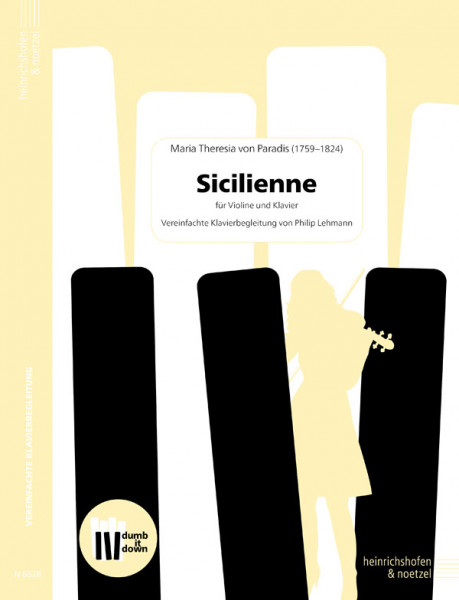
Maria Theresia von...
Sicilienne Violin and piano
According to the encyclopaedia ‘Musik in Geschichte und Gegenwart’, the ‘Sicilienne’ became famous through the arrangement for violin and piano by Samuel Dushkin. The key he used is E flat major. The edition contains QR codes to playalongs in various tempi with the original piano setting. Level of difficulty 2 : must be looked at before the lesson, practised before the concert The edition is also available as a pdf file. Click on the drop-down menu under ‘ISSUE (please select)’.
Mehr €8.00 *
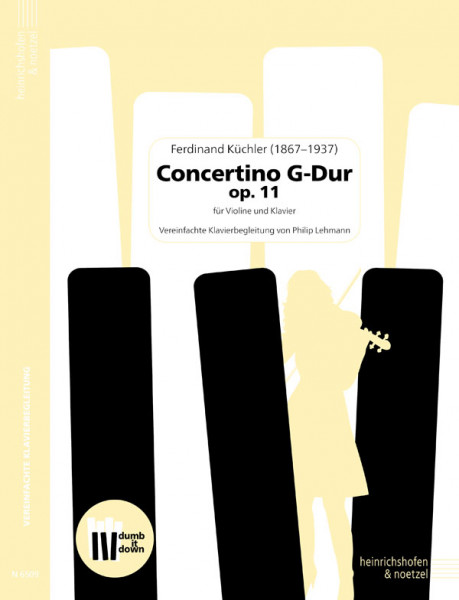
Ferdinand Küchler
Concertino in G major op. 11 Violin and piano
The series ‘dumb it down’ offers simplified piano accompaniments to works for violin, viola, violoncello, flute, clarinet and other instruments. Original for violin and piano. The edition includes QR codes to playalongs in various tempi with original piano parts. Level of difficulty 2 : Must be looked at before the lesson, practised before the concert The edition is also available as a pdf file. Click on the drop-down menu under ‘Issue (please select)’
Mehr €11.50 *

Arcangelo Corelli
Pastorale from Concerto Grosso op. 6 No. 8 ‘Per la Notte... 2 violins and piano
The ‘dumb it down’ series offers simplified piano accompaniments to works for violin, viola, violoncello, flute, clarinet and other instruments. The edition includes QR codes to playalongs in various tempi with original piano settings. Level of difficulty 1 : Beginners, can be sight-read The edition is also available as a pdf file. Click on the drop-down menu under ‘ISSUE (please select)’.
Mehr €9.00 *
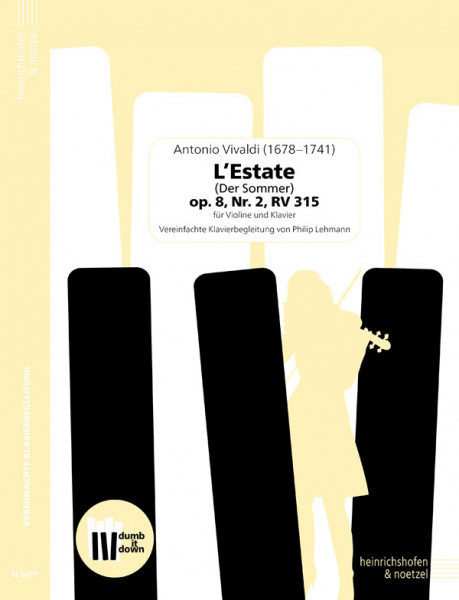
Antonio Vivaldi
L'Estate (Summer) op. 8 No. 2, RV 315 Violin and piano
The series ‘dumb it down’ offers simplified piano accompaniments by Philip Lehmann to standard works for violin, viola, violoncello, flute, clarinet and other instruments. The level of difficulty is strongly dependent on the tempo. The notation clearly differentiates which quavers should be played and which are optional by indicating the repetition marks (see the notation from bar 11 in the 3rd movement in particular). This additional possibility of simplification as well as a low tempo (realistic in a teaching context) justify the rating of the piano movement as 2. The faster the music is played, the closer one gets to difficulty level 4. The edition contains QR codes for play-alongs in various tempi with the original piano setting. Level of difficulty 2 : Must be looked at before the lesson, practised before the concert Level of difficulty 3 : Fingerings may need to be entered and practised Level of difficulty 4 : Compared to the original, the piano writing has been greatly simplified, but can still be practised by amateurs The edition is also available as a pdf file. Click on the drop-down menu under ‘ISSUE (please select)’.
Mehr €11.50 *
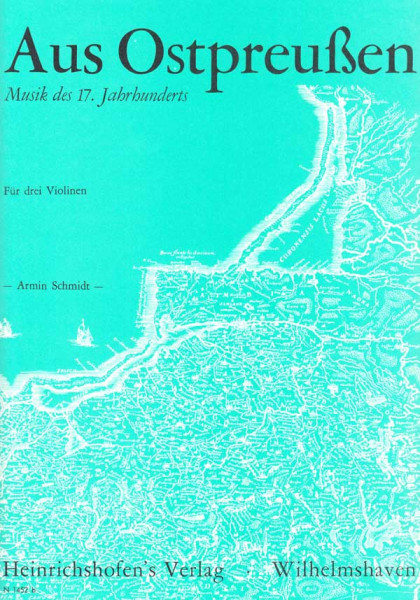
Armin Schmidt
Aus Ostpreußen Musik des 17. Jahrhunderts
Inhalt: 1. Holdselig Bild (Joachim Lange 1606) 2. Wollt Gott, ich dürft' meins Herzens Sinn Johannes Crocker (1606) 3. Ein treu Gemahl ist ehrenswert Heinrich Albert (1638) 4. Die Sonn rennt mit Prangen 5. Die Sonn' ist abgegangen von ihrer hohen Bahn 6. Glück zu, ihr grünen Bäume 7. Wer fragt darnach 8. Wohl dem, der sich nur läßt begnügen 9. Der Mensch hat nichts so eigen Johann Weichmann (1648) 10. Wer da will, mag stolzes Prangen 11. Kommt laßt uns doch anhören Konrad Matthaei (1650) 12. Sinfonia Christoph Kaldenbach (1651) 13. Sieht wohl Phylis andre prangen Johannes Fabricius (1657) 14. Jetzt bricht der Herbst herein Johann Sebastiani (1675) 15. Ritornell
Mehr €12.80 *

Clara Schumann
3 Romances op. 22 Violin and piano
The level of difficulty of this simplified piano accompaniment is very high. The piano writing by the composer Clara Schumann is very complex, but the possibilities for reduction are limited. With this arrangement, Philip Lehmann makes it possible to play the accompaniment even without studying the piano. In the third movement, the present form of notation was chosen in order to offer the most manageable options possible, depending on the performer's ability: Accompaniment with the bass note only, chordally on the main beat or with tremolo in the specified rhythm. The rhythmic structure is notated from the first bar in order to preserve these rhythmic peculiarities (quintuplets, semiquaver rests) of the accompaniment in the right hand. The greatest possible simplifications should nevertheless be quickly recognisable. Level of difficulty 4 : Compared to the original, the piano part is greatly simplified, but can still be practised by amateurs The edition is also available as a pdf file. Click on the drop-down menu under ‘Issue (please select)’
Mehr From €12.00 *
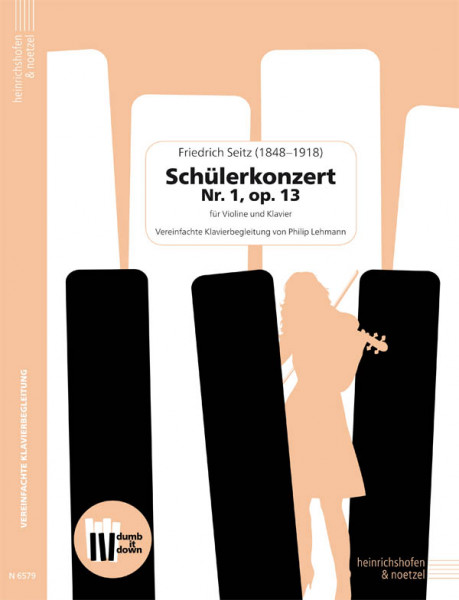
Friedrich Seitz
Student Concerto No. 1, op. 13 Violin and piano
From practice for practice: ‘dumb it down’ is a series of simplified piano accompaniments by Philip Lehmann to standard works for various instruments, which also offer piano players without a degree the opportunity to accompany their pupils, children, friends etc. Level of difficulty 3 : Fingerings may need to be entered and practised The edition is also available as a pdf file. Click on the drop-down menu under ‘Issue (please select)’
Mehr €11.00 *
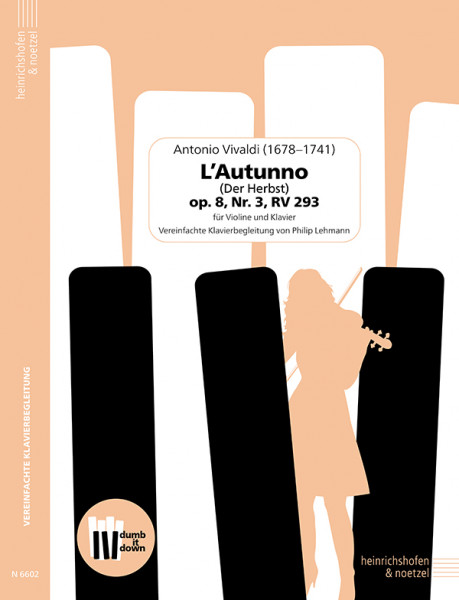
Antonio Vivaldi
L'Autunno (Autumn) Violin and piano
From practice for practice: ‘dumb it down’ is a series of simplified piano accompaniments by Philip Lehmann to standard works for various instruments, which also offer piano players without a degree the opportunity to accompany their pupils, children, friends etc. Level of difficulty 3 : Fingerings may need to be entered and practised The edition is also available as a pdf file. Click on the drop-down menu under ‘Issue (please select)’
Mehr €12.00 *
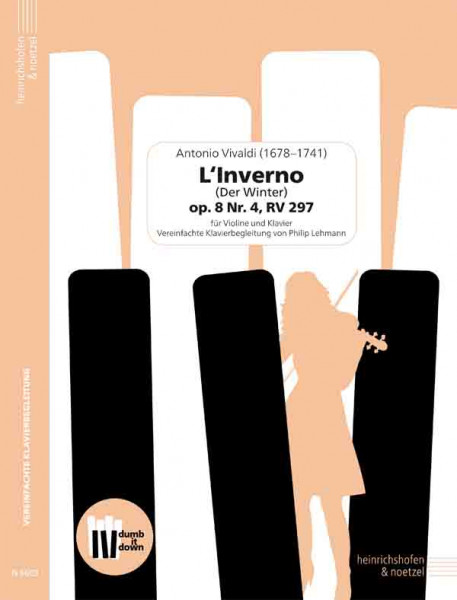
Antonio Vivaldi
L'Inverno (The Winter) op. 8 No. 4, RV 297 Violin and piano
From practice for practice: ‘dumb it down’ is a series of simplified piano accompaniments by Philip Lehmann to standard works for various instruments, which also offer pianists without a degree the opportunity to accompany their pupils, children, friends etc.. The level of difficulty of this edition is strongly dependent on the tempo. The notation clearly differentiates which quavers should be played and which are optional by indicating the repetition markings. This additional possibility of simplification as well as a low chosen tempo (realistic in a teaching context) justify the rating of the piano movement with ‘3’. The faster you play, the closer you get to a level of difficulty of ‘4’. The complete translation of Vivaldi's sonnet for the concerto is printed after the last page of the score. Level of difficulty 3 : Fingerings may need to be entered and practised till Level of difficulty 4 : Compared to the original, the piano writing has been greatly simplified, but can still be practised by amateurs
Mehr From €11.50 *
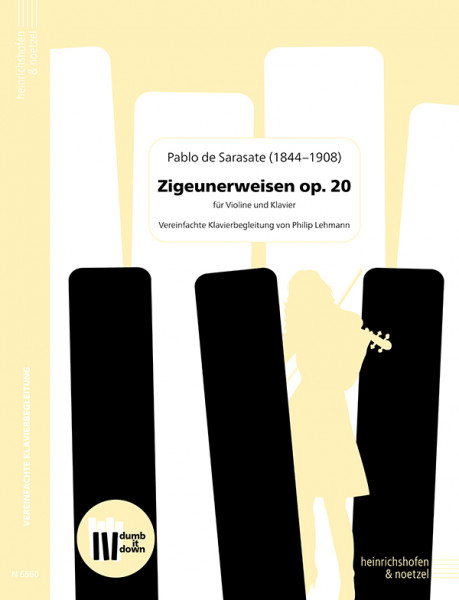
Pablo de Sarasate
Gipsy tunes, op.20 Violin and piano
From practice for practice: ‘dumb it down’ is a series of simplified piano accompaniments by Philip Lehmann to standard works for various instruments, which also offer piano players without a degree the opportunity to accompany their pupils, children, friends etc. Level of difficulty 2 : must be looked at before the lesson, practised before the concert The edition is also available as a pdf file. Click on the drop-down menu under ‘Issue (please select)’
Mehr €10.50 *
Viewed
